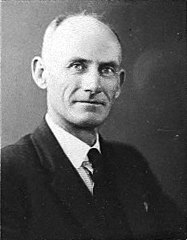James Gillespie Barclay (24 June 1882 – 5 October 1972) was a New Zealand politician of the Labour Party.
Jim Barclay | |
|---|---|
 | |
| 16th Minister of Agriculture | |
| In office 21 January 1941 – 18 October 1943 | |
| Prime Minister | Peter Fraser |
| Preceded by | Lee Martin |
| Succeeded by | Ben Roberts |
| Member of the New Zealand Parliament for Marsden | |
| In office 27 November 1935 – 25 September 1943 | |
| Preceded by | Alfred Murdoch |
| Succeeded by | Alfred Murdoch |
| Personal details | |
| Born | 24 June 1882 Banks Peninsula, New Zealand |
| Died | 5 October 1972 (aged 90) Christchurch, New Zealand |
| Political party | Labour |
| Relations | Bruce Barclay (son) Ron Barclay (nephew) |
Biography
editEarly life
editBarclay was born in Pigeon Bay on Banks Peninsula. His father was Morrison Barclay. He married Helen Betrice in 1907, but was a widower by the time he joined the army. Before World War I, he was a farmer and lived in the Christchurch suburb of Riccarton. He served with the New Zealand Expeditionary Force from 1916 to 1919.[1] He then bought a property in Pukehuia, Northland, where he owned 1,600 acres (650 ha) near the Wairoa River. He sold his farm in 1931 and retired to Whangārei. He served on several local boards in Northland.[2]
Political career
edit| Years | Term | Electorate | Party | ||
|---|---|---|---|---|---|
| 1935–1938 | 25th | Marsden | Labour | ||
| 1938–1943 | 26th | Marsden | Labour | ||
Barclay unsuccessfully stood against the Prime Minister, Gordon Coates, in the Kaipara electorate in the 1928 election.[3] In the 1931 election, he unsuccessfully challenged the incumbent in the Marsden electorate in Northland, Alfred Murdoch.[4] He beat Murdoch in the 1935 election, but was defeated in turn by Murdoch after two parliamentary terms in 1943.[5][6]
He was a cabinet minister in the First Labour Government under Peter Fraser. He was Minister of Agriculture (1941–1943), Minister of Marketing (1941–1943), Minister of Lands (1943), and Commissioner of State Forests (1943).[7]
He then became High Commissioner to Australia from 1944 to 1950.[8] His appointment (and that of the other defeated candidate Charles Boswell) attracted criticism as political appointments.[9]
Later life
editA son, Bruce Barclay, was Member of Parliament for Christchurch Central from 1969 to 1979. A nephew, Ron Barclay, was MP for New Plymouth from 1966 to 1975.[5]
James Barclay died in Christchurch in 1972.[1]
Notes
edit- ^ a b "Personnel Records". Archives New Zealand. 23 August 2011. Archived from the original (PDF) on 3 July 2013. Retrieved 14 September 2012.
- ^ "New Parliament". The New Zealand Herald. Vol. LXXII, no. 22278. 28 November 1935. p. 13. Retrieved 19 July 2015.
- ^ The General Election, 1928. Government Printer. 1929. p. 3. Retrieved 23 November 2014.
- ^ The General Election, 1931. Government Printer. 1932. p. 3. Retrieved 2 November 2014.
- ^ a b Wilson 1985, p. 182.
- ^ The General Election, 1943. National Library. 1944. p. 6. Retrieved 19 July 2015.
- ^ Wilson 1985, p. 83.
- ^ Wilson, Roland, ed. (1946). Official Year Book of the Commonwealth of Australia: No. 37—1946 and 1947. Australian Bureau of Statistics. p. 1223.
- ^ Hensley, Gerald (2009). Beyond the Battlefield: New Zealand and its Allies 1939–45. North Shore Auckland: Viking/Penguin. pp. 330, 331. ISBN 978-06-700-7404-4.
References
edit- Gustafson, Barry (1986). From the Cradle to the Grave: a biography of Michael Joseph Savage. Auckland: Reed Methuen. ISBN 0-474-00138-5.
- Wilson, James Oakley (1985) [First ed. published 1913]. New Zealand parliamentary record, 1840–1984 (4 ed.). Wellington: V.R. Ward, Govt. Printer. OCLC 154283103.
External links
edit- Portrait photo published in The New Zealand Herald in 1931